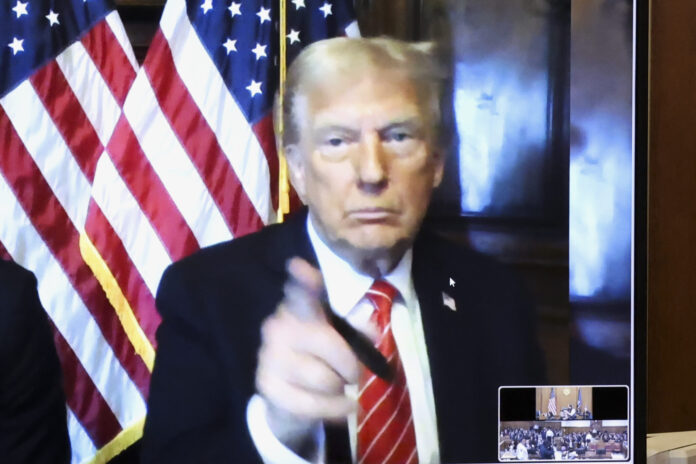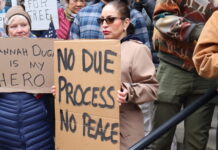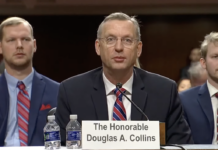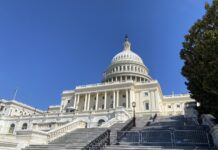
WASHINGTON (States Newsroom) — President-elect Donald Trump was sentenced Friday in his New York hush money case just days before his inauguration, making him the only past and future U.S. president with a criminal record.
Trump has faced four criminal prosecutions but the New York state case was the sole one that went to trial. A jury convicted him in May on 34 felonies for falsifying invoices, checks and ledger entries that amounted to a $130,000 reimbursement to his lawyer for paying off a porn star ahead of the 2016 presidential election.
New York Justice Juan Merchan sentenced the president-elect to an “unconditional discharge,” handing down no jail time or fines but cementing a mark on Trump’s record 10 days before he takes the oath of office to become the 47th president.
Speaking during the virtual proceeding from his Mar-a-Lago residence, Trump said he was “totally innocent” and defended the description of his payments to his lawyer in business records as “legal expenses.” As he has in the past, he accused the federal government of being involved in the New York state case.
“It’s been a political witch hunt that was done to damage my reputation so that I’d lose the election, and obviously that didn’t work. And the people of our country got to see first hand because they watched the case in your courtroom,” the president-elect said, according to audio published by C-SPAN. Cameras were not allowed in the courtroom during the trial or sentencing.
The courtroom contains limited space for the public and journalists.
Merchan called the case “extraordinary” but said “The same burden of proof was applied and a jury made up of ordinary citizens delivered a verdict.”
After Merchan explained the sentence, he told Trump, “Sir, I wish you Godspeed as you pursue your second term in office.”
Trump was represented Friday morning, and at trial, by his personal lawyer Todd Blanche, whom he’s chosen to be the nation’s next deputy attorney general, the No. 2 position at the U.S. Justice Department.
Trump last-minute attempt
Following months of delays, the sentencing went forth despite Trump’s eleventh-hour request that the U.S. Supreme Court halt the proceeding. The justices denied Trump’s application late Thursday, though the order noted that Justices Clarence Thomas, Samuel Alito, Neil Gorsuch and Brett Kavanaugh would have granted it.
ABC News reported Thursday that Trump had spoken with Alito by phone just hours before submitting the application to the court’s emergency docket. Alito told the network that the two did not speak about the application.
The sentencing, lasting less than 30 minutes, was a brief disruption in Trump’s barreling preparations for his second presidency. The president-elect was set to host members of the House Freedom Caucus, a contingent of far-right House Republicans, at his Florida property later on Friday. Trump huddled with Senate Republicans on Capitol Hill Wednesday and with Republican governors on Thursday.
Trump slammed his sentence on his Truth Social platform as a “scam,” “hoax” and “despicable charade” that he will appeal, a process that will likely drag on for years in New York.
“The real Jury, the American People, have spoken, by Re-Electing me with an overwhelming MANDATE in one of the most consequential Elections in History,” Trump wrote.
The 12 jurors in New York that convicted Trump were also U.S. citizens, or “American people,” as required by law.
Immunity argument
Trump had challenged his New York conviction on the grounds that last summer the Supreme Court ruled that former presidents enjoy criminal immunity for official acts while in office, and presumptive immunity for acts on the perimeter of their formal duties.
Merchan ultimately denied Trump’s immunity argument, saying that the trial and evidence “related entirely to unofficial conduct entitled to no immunity protection.”
Trump has also been occupied with another legal battle in recent days as he cheered a court order to blockthe release of Justice Department special counsel Jack Smith’s final report detailing federal criminal charges against Trump for mishandling and hoarding classified documents at his Mar-a-Lago estate after he left office, and for scheming to subvert the 2020 presidential election results.
Smith ended both cases following Trump’s election victory, as the Justice Department has a long-standing protocol against prosecuting sitting presidents.
A federal appeals court Friday denied requests to block the report in full, leaving only protections for the portion of the report dealing with the classified documents case following an appeal by Trump’s two co-defendants in the case.







